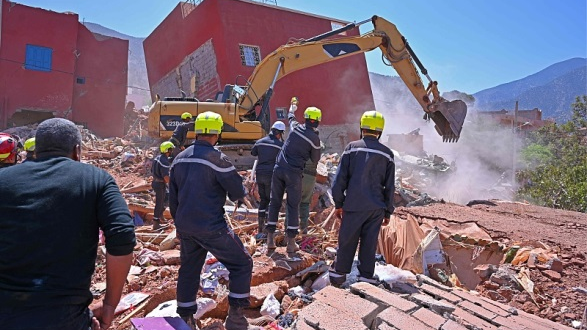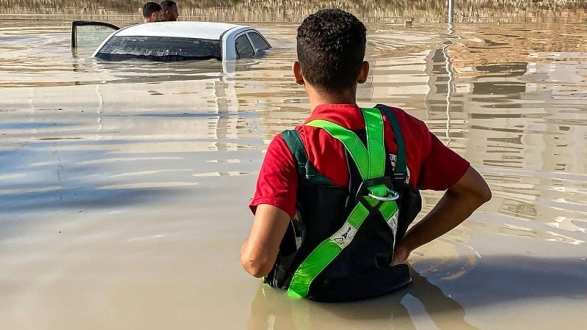
Rescue workers search for survivors in the rubble of damaged houses, Morocco, September 11, 2023. /CFP
Rescue workers search for survivors in the rubble of damaged houses, Morocco, September 11, 2023. /CFP
Editor's note: Nikola Mikovic, a special commentator on current affairs for CGTN, is a freelance journalist in Serbia. He covers mostly Russian, Ukrainian and Belarusian foreign policy issues and writes for multiple web magazines. The article reflects the author's opinions and not necessarily those of CGTN.
The only thing humans are truly equal in is death. Despite this fact, not all deaths – especially when it comes to natural disasters – receive equal treatment in global media.
It is an open secret that some lives are more valuable than others. Some regions arouse more interest in the media than others. Rich countries of the West are far more interested in disasters occurring in one of their own countries than in developing nations around the world.
For the Western audience, the Christchurch earthquake of 2011 – which resulted in 185 deaths – had far greater importance than the catastrophic 7.0-magnitude earthquake that struck Haiti one year earlier, killing between 150,000 and 300,000 men, women and children. Moreover, even though in February this year both Türkiye and Syria suffered from one of the most destructive earthquakes in the 21st century, for political reasons, Ankara got much greater support than Damascus.
Following the tragedy, donors at a European Union-led conference pledged 7 billion euros ($7.5 billion) to help rebuild southern and central Türkiye's regions. Nations around the globe were quick to provide financial aid and send rescue teams to Türkiye. But can Morocco, a North African nation that was hit by the deadly earthquake of magnitude 6.8 last week, expect to get significant help to deal with the consequences of the natural disaster?
At this point, according to reports, rescue teams from only four countries – Spain, the UK, Qatar, and the United Arab Emirates – are on the ground in Morocco, where the death toll has neared 3,000 people. However, it seems to be a matter of time before the authorities in Rabat allow other nations – especially those that Morocco sees as friendly – to dispatch various teams to the historic city of Marrakesh, which was the epicenter of the earthquake.

People standing in an inundated area near a submerged vehicle in the wake of floods after the Mediterranean storm "Daniel" hit Libya's eastern city of Derna, September 13, 2023. /CFP
People standing in an inundated area near a submerged vehicle in the wake of floods after the Mediterranean storm "Daniel" hit Libya's eastern city of Derna, September 13, 2023. /CFP
On September 9, one day after the earthquake struck central Morocco, Chinese President Xi Jinping sent a message of condolence to King Mohammed VI of Morocco, while the Red Cross Society of China announced that it would provide the Moroccan Red Crescent with $200,000 in cash. It was a message that Rabat could count on Beijing's support.
Following the tragic event in Türkiye, China has deployed several satellites to capture images of the quake-hit areas, helping the country to better analyze the disaster situation and allocate relief resources. It has also sent several lighting drones that have been used to illuminate the disaster zone at night. Thus, Morocco can likely count on China's technology, as well as on the assistance of its medical teams, while the China International Development Cooperation Agency has announced that it is willing to provide emergency humanitarian assistance. And, Chinese residents in Morocco rushed to provide aid in cash according to local reports.
Besides Beijing, other global and regional actors have also offered their help to the North African country. Quite aware of the problems that Morocco is facing, Turkish President Recep Tayyip Erdogan offered support to "Moroccan brothers in every way in this difficult hour." The EU, for its part, decided to allocate 1 million euros to the North African country. Russian President Vladimir Putin said, in a message to Morocco's king, that Moscow "shares the pain and the mourning of the friendly Moroccan people." Meanwhile, Ukraine's President Volodymyr Zelenskky also expressed his "deepest condolences to King Mohammed VI and all Moroccans for the lives lost in the horrible earthquake."
The problem, however, is that some natural disasters receive more support than others because of the way they are perceived by the public. Global media are simply not going to pay equal attention to all crises.
Disasters in Africa, even though it is quite close to Europe – are usually of little interest to the West, since they are happening to people living in countries that are not "important enough" for the Western audience. This is based on the presentation by the media. Therefore, for geopolitical reasons, Morocco and Libya can unlikely count on the same volume of Western support.
The flood that happened on September 13 has caused thousands of deaths so far in eastern Libya, and the situation is getting worse, while the Western media has little reports on this.
But that does not mean that the world in general will turn a blind eye to the tragedy Morocco and Libya are facing. A friend in need is a friend indeed. The coming days and weeks will show that Morocco and Libya have enough friends around the globe who are ready to help in this difficult hour.
(If you want to contribute and have specific expertise, please contact us at opinions@cgtn.com. Follow @thouse_opinions on Twitter to discover the latest commentaries in the CGTN Opinion Section.)